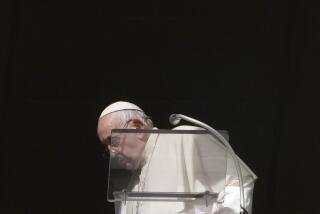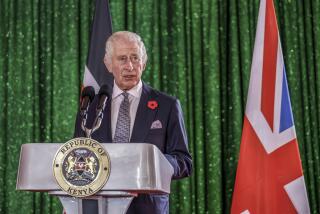Address in Kenya Precedes Visit to Morocco : Pope Ends Mission, Assails Apartheid
- Share via
NAIROBI, Kenya — Pope John Paul II ended his third and most extensive mission to black Africa Sunday with a condemnation of South African apartheid as an “affront (that) dishonors human freedom.”
Speaking here on the eve of his departure for Arab Morocco, the pontiff returned to the broad themes that he pursued in five other equatorial African countries during the last 11 days--respect for the rights of the individual and both material and spiritual self-improvement by Africans working to solve their own problems.
“The ultimate determining factor is the human person,” John Paul told a gathering of Kenyans and international ecologists at the headquarters of the U.N. Environment Program here.
“It is not science and technology or the increasing means of economic and material development but the human person--and especially groups of persons, communities and nations, freely choosing to face the problems together--who will, under God, determine the future.
‘Affront to Man’s Vocation’
“That is why whatever impedes human freedom or dishonors it, such as the evil of apartheid and all forms of prejudice and discrimination, is an affront to man’s vocation to shape his own destiny.”
He called upon Africans to develop and use the advanced skills and expertise necessary to solve their environmental problems.
“In this way, the stewardship over nature, entrusted by God to man, will not be guided by shortsightedness or selfish pursuit,” John Paul said. “Rather, it will take into account the fact that all created goods are directed to the good of all humanity.”
At a morning Mass in Nairobi’s Uhuru Park--where he addressed the largest crowd of the trip, with estimates running as high as 1 million--the pontiff renewed his appeal for African and international help to relieve the plight of the famine-stricken sub-Saharan region, evoking a similar, emotional plea he made on a trip to Africa five years ago.
“I cannot be silent when my brothers and sisters are threatened,” he said. “I become here the voice of those who have no voice--the voice of the innocent who died because they lacked water and bread; the voice of fathers and mothers who saw their children die without understanding, or who will always see in their children the aftereffects of the hunger they have suffered; the voice of the generations to come who must no longer live with this terrible threat weighing upon their lives.”
Food and Weapons
He added, “Peace is built up when national budgets are finally diverted from the creation of more powerful and deadlier weapons to provide food and raw materials to meet basic human needs.”
Then, in a brief address to a group of Muslims and Hindus, John Paul reasserted his demand that the leaders of Africa honor the universality of man.
“We are all children of the same God, members of the great family of man,” he said. “Our presence together today, . . . gathered in friendship--is a hopeful sign in a pluralistic world filled with tensions. No religious group can afford to live and act in isolation. While respecting one another’s convictions, we need each other’s help.”
Throughout his African journey, the pontiff has been conciliatory in his meetings with non-Christians, ignoring differences and instead stressing the need for unified social action and religious tolerance.
However, his main emphasis has been on what he calls “the second evangelization of Africa”--meaning that the days of the missionary church, in which all of the spiritual and social work of the church was done by outsiders, are over.
The time has come, he has been saying, when both the native-born church hierarchy and lay people must seize the responsibility for spreading Christianity and for solving the political, social and economic problems of their countries.
“He has especially addressed this message to the lay people, the new generation of Christians growing up in Africa, for it is they who must ultimately reform the corrupt and often brutal governments that rule here,” a Vatican official explained.
The pontiff leaves Nairobi today on an eight-hour flight to Casablanca, Morocco, where he will join King Hassan II in addressing a mass meeting of Muslim youths, gathered for a sports festival of Islamic nations.
More to Read
Sign up for Essential California
The most important California stories and recommendations in your inbox every morning.
You may occasionally receive promotional content from the Los Angeles Times.













